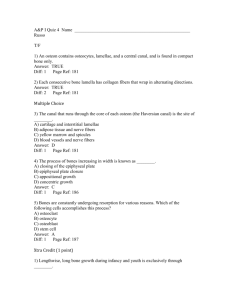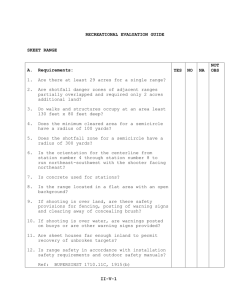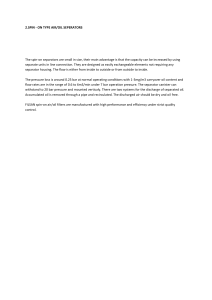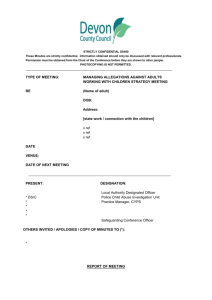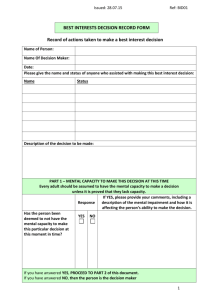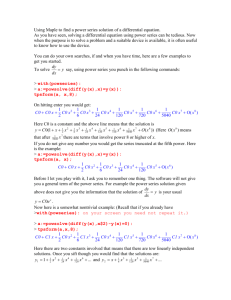Sample
advertisement
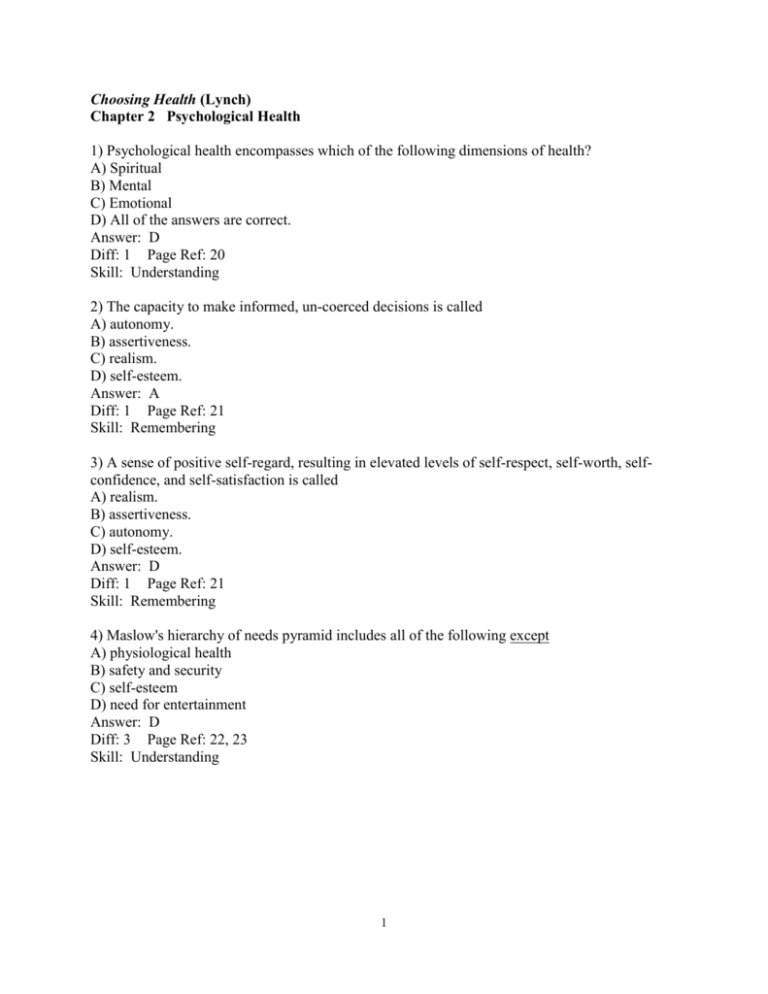
Choosing Health (Lynch) Chapter 2 Psychological Health 1) Psychological health encompasses which of the following dimensions of health? A) Spiritual B) Mental C) Emotional D) All of the answers are correct. Answer: D Diff: 1 Page Ref: 20 Skill: Understanding 2) The capacity to make informed, un-coerced decisions is called A) autonomy. B) assertiveness. C) realism. D) self-esteem. Answer: A Diff: 1 Page Ref: 21 Skill: Remembering 3) A sense of positive self-regard, resulting in elevated levels of self-respect, self-worth, selfconfidence, and self-satisfaction is called A) realism. B) assertiveness. C) autonomy. D) self-esteem. Answer: D Diff: 1 Page Ref: 21 Skill: Remembering 4) Maslow's hierarchy of needs pyramid includes all of the following except A) physiological health B) safety and security C) self-esteem D) need for entertainment Answer: D Diff: 3 Page Ref: 22, 23 Skill: Understanding 1 5) Juanita is trying to improve her self-esteem. All of the following suggestions will help her except A) relying on others to take care of her responsibilities. B) learning something new. C) practicing positive self-talk. D) eating a healthy diet and exercising. Answer: A Diff: 2 Page Ref: 22 Skill: Applying 6) The psychological tendency to have a positive interpretation of life's events is called A) intimacy. B) optimism. C) pessimism. D) self-actualization. Answer: B Diff: 1 Page Ref: 22 Skill: Understanding 7) Which of the following techniques can help increase emotional intelligence? A) Recognizing and naming your emotions when you feel them. B) Thinking about other people's feelings and motivations in relation to specific situations or actions. C) Accepting your own emotions without allowing them to override your priorities. D) All of the answers are correct. Answer: D Diff: 1 Page Ref: 23 Skill: Understanding 8) James is practicing this technique when he enjoys the experience of fishing with his son instead of thinking about his problems. A) Mindfulness B) Meditation C) Solitude D) Altruism Answer: A Diff: 1 Page Ref: 23 Skill: Applying 9) Having an optimistic outlook has been associated with all of the following except A) carrying less anger. B) a decreased likelihood of getting sick with serious or minor illness. C) a higher likelihood of developing diabetes. D) a better ability to cope with the ups and downs of illness. Answer: C Diff: 2 Page Ref: 24 Skill: Understanding 2 10) People meditate for which of the following reasons? A) To develop creativity and self-awareness. B) To reach a higher level of consciousness. C) To be more relaxed. D) All of the answers are correct. Answer: D Diff: 2 Page Ref: 25 Skill: Understanding 11) The practice of helping and giving to others out of a genuine concern for their well-being is called A) shyness. B) altruism. C) mindfulness. D) spirituality. Answer: B Diff: 2 Page Ref: 25 Skill: Understanding 12) This question refers to Chase's Student Story in the chapter. What factor(s) is/are contributing to Chase's feeling of homesickness? A) Missing family and friends B) Feeling disconnected from his dorm-mates C) Missing his former routines D) All of the answers are correct. Answer: D Diff: 1 Page Ref: 26 Skill: Applying 13) Which of the following is the most effective way to deal with feelings of anger? A) Express feelings of anger in a way that releases emotions without damaging relationships. B) Hold the feelings inside. C) Express anger impulsively and aggressively. D) Refrain from expressing negative emotions. Answer: A Diff: 3 Page Ref: 26 Skill: Applying 14) Mental disorders can be caused by A) past or current experiences. B) extreme stress. C) chemical imbalances. D) All of the answers are correct. Answer: D Diff: 1 Page Ref: 27 Skill: Understanding 3 15) Major depressive disorder is diagnosed when a person experiences A) five or more depressive symptoms for at least two weeks straight. B) occasional loss of interest in things that were once important. C) mild chronic depressive symptoms for two or more years. D) apprehension in social situations. Answer: A Diff: 2 Page Ref: 28 Skill: Remembering 16) Which of the following increase a person's risk for depression? A) Being pessimistic B) Having low self-esteem C) Having a limited network of emotional support D) All of the answers are correct. Answer: D Diff: 1 Page Ref: 28 Skill: Understanding 17) Which of the following statements is true regarding mental disorders and minorities? A) The tendency toward depression is more inborn in minorities than in heterosexual Caucasians. B) African Americans and Mexican Americans have lower rates of depression than Caucasians. C) The challenges many minorities face increase their likelihood of developing depression. D) Most minorities have mental-health insurance coverage. Answer: C Diff: 2 Page Ref: 29 Skill: Understanding 18) A depressive disorder caused by experiencing fewer hours of daylight during the winter months is called A) bipolar disorder. B) seasonal affective disorder. C) attention deficit disorder. D) social anxiety disorder. Answer: B Diff: 2 Page Ref: 28 Skill: Understanding 19) Which of the following is true of men and depression? A) Men are more likely than women to seek treatment for depression. B) Men do not experience any physical effects of depression. C) Men are more likely to turn to drugs and alcohol to deal with depression than women. D) Men with depression are less likely to contract heart disease. Answer: C Diff: 2 Page Ref: 30 Skill: Remembering 4 20) Which of the following is not true of antidepressants? A) They work by normalizing the levels of the neurotransmitters serotonin, norepinephrine, or dopamine. B) Abruptly stopping use of antidepressants can cause withdrawal symptoms. C) The same drug that helps one person may not help another person. D) They have no side effects. Answer: D Diff: 2 Page Ref: 30 Skill: Understanding 21) Attention-deficit/hyperactivity disorder can cause which of the following? A) Impulsivity B) Inattention C) Fidgeting D) All of the answers are correct. Answer: D Diff: 1 Page Ref: 31 Skill: Understanding 22) Sudden feelings of terror that strike without warning are characteristic of A) generalized anxiety disorder. B) depression. C) a panic attack. D) seasonal affective disorder. Answer: C Diff: 2 Page Ref: 32 Skill: Applying 23) All of the following statements regarding generalized anxiety disorder are true except A) Its sufferers feel worry, anxiety and pessimism even when there is little or nothing to provoke it. B) Physical symptoms, such as headaches, muscle tension, and difficulty swallowing often accompany the anxiety. C) It affects twice as many men as women. D) It can be diagnosed when the symptoms last six months or more. Answer: C Diff: 2 Page Ref: 32 Skill: Understanding 24) Which of the following are signs of social anxiety disorder? A) Cancelling social engagements at the last moment B) Having few friends who really know you C) Avoiding enjoyable activities because they require social interaction D) All of the answers are correct. Answer: D Diff: 2 Page Ref: 33 Skill: Understanding 5 25) A person with obsessive-compulsive disorder concerned about germs may A) be embarrassed about his or her repeated rituals. B) perform hand washing more than 100 times per day. C) get brief relief by repeating a ritual. D) All of the answers are correct. Answer: D Diff: 3 Page Ref: 33 Skill: Applying 26) After witnessing a fatal automobile accident, Marisela developed this disorder that causes her to feel depressed and emotionally numb. She has also has reoccurring nightmares about the accident scene. Her symptoms are characteristic of A) generalized anxiety disorder. B) obsessive compulsive disorder. C) panic disorder. D) post traumatic stress disorder. Answer: D Diff: 2 Page Ref: 34 Skill: Applying 27) To treat his fear of heights, Michael underwent systematic desensitization. Which of the following was/were likely components of his treatment? A) Climbing stairs or taking an elevator to gradually increasing heights B) Talking to a therapist about the anxiety he feels C) Having the assistance of a therapist while dealing with the anxiety accompanying his ascent D) All of the answers are correct. Answer: D Diff: 3 Page Ref: 34 Skill: Applying 28) All of the following are symptoms of schizophrenia except A) delusions. B) hallucinations. C) the ability to distinguish what is real from what is imaginary. D) inappropriate emotions. Answer: C Diff: 2 Page Ref: 34 Skill: Understanding 29) People who commit self-injury usually do so for all of the following reasons except A) to deal with negative or overwhelming emotions. B) to get attention. C) to kill themselves. D) to punish themselves. Answer: C Diff: 2 Page Ref: 35 Skill: Understanding 6 30) Recall the Student Story about Kristina. After Kristina's friend committed suicide, what became more important in her life? A) Attending social events B) Traveling frequently C) Developing closer relationships with her friends and family D) Focusing on her own mortality Answer: C Diff: 2 Page Ref: 35 Skill: Remembering 31) The highest suicide rates are in this ethnic group. A) Hispanics B) Asian Americans C) Pacific Islanders D) Native Americans and Alaskan Natives Answer: D Diff: 2 Page Ref: 35 Skill: Remembering 32) Self-care includes all of the following except A) eating well. B) getting enough sleep. C) getting enough exercise. D) drinking alcohol to help deal with stress. Answer: D Diff: 1 Page Ref: 36 Skill: Understanding 33) Which of the following mental health professionals has the authority to prescribe medications? A) Counselors B) Psychologists C) Psychiatrists D) None of the answers is correct. Answer: C Diff: 2 Page Ref: 37 Skill: Remembering 34) A mental health professional with a doctoral degree but not a medical degree describes which of the following? A) A psychiatrist B) A psychologist C) A counselor D) None of the answers is correct. Answer: B Diff: 2 Page Ref: 37 Skill: Understanding 7 35) Cognitive therapy focuses on changing A) unconscious sources for a person's behavior. B) negative and distorted thoughts. C) a person's level of optimism. D) a person's response to medication. Answer: B Diff: 1 Page Ref: 37 Skill: Understanding 36) Justin is seeking the help of a therapist. Which of the following factors should he discuss before his first session? A) The cost B) The therapist's credentials and approach to therapy C) The experience the therapist has in helping others with similar issues D) All of the answers are correct. Answer: D Diff: 2 Page Ref: 37 Skill: Applying 37) Behavioral therapy includes all the following techniques except A) exposure therapy. B) biofeedback. C) negative reinforcement. D) positive reinforcement. Answer: B Diff: 2 Page Ref: 37 Skill: Understanding 38) Although Jenna has a 3.8 GPA, she doesn't believe she is a good student. What type of cognitive distortion is this? A) Disqualifying the positive B) Overgeneralization C) Minimizing D) Catastrophizing Answer: A Diff: 3 Page Ref: 38 Skill: Applying 39) An emerging field of psychology that focuses on increasing psychological strengths and improving happiness rather than on psychological problems is A) psychodynamic therapy. B) positive psychology. C) behavioral therapy. D) cognitive therapy. Answer: B Diff: 2 Page Ref: 38 Skill: Understanding 8 40) In psychodynamic therapy the therapist and patient explore A) the patient's conscious behaviors. B) unresolved issues buried in the unconscious. C) incorporating positive ideas. D) how to identify distorted, negative thinking. Answer: B Diff: 2 Page Ref: 38 Skill: Understanding 41) When her boyfriend is feeling slighted over an event that occurred at work, Meghan feels that she is at fault for his negative feelings. This is an example of A) overgeneralization. B) personalization. C) emotional reasoning. D) mental filtering. Answer: B Diff: 2 Page Ref: 38 Skill: Applying 42) The typical college student is likely to experience loneliness, sadness, anxiety or stress at some point. Answer: TRUE Diff: 1 Page Ref: 20 Skill: Understanding 43) Mental health is the component of psychological health that pertains to a person's feelings and emotions. Answer: FALSE Diff: 1 Page Ref: 20 Skill: Understanding 44) Spirituality can mean different things to different people. Answer: TRUE Diff: 2 Page Ref: 20 Skill: Understanding 45) Individuals with high self-esteem tend to be more resilient and optimistic than those with a low self-esteem. Answer: TRUE Diff: 1 Page Ref: 21 Skill: Understanding 46) An assertive person uses anger and hostility to make a point. Answer: FALSE Diff: 1 Page Ref: 21 Skill: Understanding 9 47) A person who is autonomous relies on the judgment of others when making decisions. Answer: FALSE Diff: 1 Page Ref: 21 Skill: Understanding 48) A realist is able to perceive reality as it is. Answer: TRUE Diff: 1 Page Ref: 21 Skill: Understanding 49) Emotional intelligence is the same thing as intellectual intelligence. Answer: FALSE Diff: 2 Page Ref: 23 Skill: Understanding 50) The highest level in Maslow's hierarchy of needs is having a high self-esteem. Answer: FALSE Diff: 1 Page Ref: 23 Skill: Remembering 51) A person needs to belong to an organized religion to have spirituality. Answer: FALSE Diff: 1 Page Ref: 23 Skill: Understanding 52) The values a person has as an adult are developed shortly after birth and remain unchanged. Answer: FALSE Diff: 2 Page Ref: 23 Skill: Understanding 53) Studies show that optimists live longer. Answer: TRUE Diff: 2 Page Ref: 24 Skill: Understanding 54) Physical health can decline when a person has a negative outlook or high levels of stress and anxiety. Answer: TRUE Diff: 2 Page Ref: 24 Skill: Understanding 55) Only 10% of college students consider themselves shy. Answer: FALSE Diff: 2 Page Ref: 25 Skill: Remembering 10 56) Shyness is a result of genetics and cannot be altered by a person's environment. Answer: FALSE Diff: 2 Page Ref: 25 Skill: Understanding 57) Loneliness can cause depression and other health problems. Answer: TRUE Diff: 1 Page Ref: 26 Skill: Understanding 58) Holding in angry feelings can be as physiologically damaging as expressing anger or rage. Answer: TRUE Diff: 2 Page Ref: 26 Skill: Understanding 59) Because bad moods are the result of external, uncontrollable factors, they are out of a person's control. Answer: FALSE Diff: 2 Page Ref: 27 Skill: Understanding 60) Depressive disorders often occur in conjunction with anxiety disorders and substance abuse. Answer: TRUE Diff: 1 Page Ref: 28 Skill: Understanding 61) Anxiety disorders are the most common mental health problems among American adults. Answer: TRUE Diff: 2 Page Ref: 32 Skill: Understanding 62) Panic disorder can lead to agoraphobia. Answer: TRUE Diff: 2 Page Ref: 32 Skill: Understanding 63) A debilitating symptom of panic disorder is the dread of the next panic attack. Answer: TRUE Diff: 1 Page Ref: 32 Skill: Remembering 64) Social anxiety disorder can lead a person to isolation. Answer: TRUE Diff: 2 Page Ref: 32 Skill: Understanding 11 65) The most common anxiety disorder is schizophrenia. Answer: FALSE Diff: 2 Page Ref: 34 Skill: Understanding 66) Schizophrenia is effectively treated with systematic desensitization therapy. Answer: FALSE Diff: 2 Page Ref: 34 Skill: Understanding 67) More women die from committing suicide than men. Answer: FALSE Diff: 2 Page Ref: 35 Skill: Understanding Match the following: A) Susan views her life with a positive interpretation. B) Brittany respects herself, believes in her abilities, and is satisfied with her achievements. C) David expresses his needs and wants to others in appropriate ways. D) No longer living at home, Julia must decide for herself which college she will attend. E) After getting married and completing his Ph.D., Enrique achieved his lifelong goals. 68) Autonomy Diff: 2 Page Ref: 21 Skill: Applying 69) Assertiveness Diff: 2 Page Ref: 21 Skill: Applying 70) Self-esteem Diff: 2 Page Ref: 21 Skill: Applying 71) Self- actualization Diff: 2 Page Ref: 22 Skill: Applying 72) Optimism Diff: 2 Page Ref: 22 Skill: Applying Answers: 68) D 69) C 70) B 71) E 72) A 12 Match the following: A) the component of psychological health dealing with feelings B) being able to monitor, assess and manage emotions C) the component of psychological health associated with a connection to a higher purpose D) the "thinking" component of psychological health E) being connected to something larger than yourself 73) Emotional intelligence Diff: 2 Page Ref: 23 Skill: Understanding 74) Mental health Diff: 2 Page Ref: 20 Skill: Understanding 75) Emotional health Diff: 2 Page Ref: 20 Skill: Understanding 76) Spiritual health Diff: 2 Page Ref: 20 Skill: Understanding 77) Spirituality Diff: 2 Page Ref: 23 Skill: Understanding Answers: 73) B 74) D 75) A 76) C 77) E 13 Match the following: A) Ana has occurrences of mania followed by occurrences of depression. B) For the past six months, Davis has experienced chronic worry that seems to be out of his control. C) For months, Paula has had no interest in daily life and doesn't get out of bed most days. D) When Rick has to do a class presentation, he experiences symptoms of increased heart rate, trembling, and stuttering. E) During winter months, Luci experiences this form of depression. 78) Depressive disorder Diff: 2 Page Ref: 28 Skill: Applying 79) Seasonal affective disorder Diff: 2 Page Ref: 28 Skill: Applying 80) Bipolar disorder Diff: 2 Page Ref: 31 Skill: Applying 81) Generalized anxiety disorder Diff: 2 Page Ref: 32 Skill: Applying 82) Social anxiety disorder Diff: 2 Page Ref: 32 Skill: Applying Answers: 78) C 79) E 80) A 81) B 82) D 83) Brian has difficulty expressing his feelings and struggles with depression. These issues will most largely impact his ________ dimension of psychological health. Answer: emotional Diff: 2 Page Ref: 20 Skill: Understanding 84) Prayer triggers the ________ response, which is characterized by a slowed metabolism, reduced blood pressure, slower breathing, decreased heart rate, and less active brain waves. Answer: relaxation Diff: 1 Page Ref: 24 Skill: Remembering 14 85) Seasonal ________ disorder, or SAD, is a type of depression people suffer from when there are fewer daylight hours. Answer: affective Diff: 1 Page Ref: 28 Skill: Remembering 86) Women's risks of short-term and long-term depression can be increased by ________ shifts. Answer: hormonal Diff: 2 Page Ref: 29 Skill: Understanding 87) Justine, who has ________ disorder, has periods of depression followed by periods of mania. Answer: bipolar Diff: 1 Page Ref: 31 Skill: Remembering 88) Sudden feelings of terror that strike without warning describes ________ attacks. Answer: panic Diff: 2 Page Ref: 32 Skill: Understanding 89) A phobia of heights is classified as a ________ environment phobia. Answer: natural Diff: 1 Page Ref: 33 Skill: Remembering 90) The most common psychotic disorder is ________. Answer: schizophrenia Diff: 1 Page Ref: 34 Skill: Remembering 91) Behavioral therapy focuses on changing a person's ________ behaviors. Answer: learned Diff: 1 Page Ref: 37 Skill: Understanding 15 92) Discuss five characteristics of a psychologically healthy person. Answer: Any five of the following: • Expresses feelings in ways that are honest, self-accepting, and not harmful to others. • Prevents and manages stress and conflict in ways that lead to optimal health. • Seeks help for disruptive or troublesome feelings. • Focuses on positive rather than self-destructive activities. • Uses self-control. • Is empathetic towards others. • Understands and fulfills personal responsibilities. • Establishes and maintains relationships that are fulfilling, supportive, and based on mutual respect. Diff: 3 Page Ref: 21 Skill: Understanding 93) Discuss three ways to build self-esteem. Answer: Any three of the following: • Take care of yourself by making time to exercise, eat right, and have fun. • Pat yourself on the back. • Practice positive self-talk. • Stretch your abilities by trying something new. • Tackle your to do list. • Listen to yourself. • Reach out and help others. Diff: 3 Page Ref: 22 Skill: Understanding 94) Explain the relationship between optimism and health. Answer: Optimism helps patients fighting serious disease maintain a positive outlook. Optimistic people are more likely to live longer and less likely to get sick with minor illness. Diff: 2 Page Ref: 22 and 24 Skill: Analyzing 95) This question refers to Chase's Student Story in the chapter. As Chase's homesickness largely consists of loneliness, what two or three strategies might help him overcome his homesickness? Answer: He could take advantage of social opportunities on campus. He could seek counseling from his campus counseling center. He could share his feelings with a friend. Diff: 4 Page Ref: 26 Skill: Analyzing 16 96) Discuss three strategies for overcoming a bad mood. Answer: Any three of the following: • Change what has upset you by taking action. • Don't drink or use drugs to cope. • Don't stew over the problem. • If you can't change one thing, change another. Diff: 3 Page Ref: 27 Skill: Understanding 97) Explain the difference between dysthymia and major depressive disorder. Answer: A person must experience five or more depression symptoms including loss of interest or pleasure for at least two weeks straight to be diagnosed with major depressive disorder. Dysthymia is milder, chronic depression that persists for at least two years. Diff: 3 Page Ref: 28 Skill: Analyzing 98) Discuss two reasons why women may be more prone to depression than men. Answer: Any of the following two: • The hormonal shifts that women experience with menstruation, pregnancy, postpartum, and menopause increase their risk of depression. • Women who work full time and raise children have more stress that may lead to depression. • Women experience higher rates of sexual abuse, poverty, and low self-esteem than men, which can lead to depression. Diff: 3 Page Ref: 30 Skill: Understanding 99) What symptoms might a college student with attention-deficit/hyperactivity disorder manifest? Answer: The student may have trouble remembering, concentrating, and following directions. He or she may also be anxious, chronically late, and disorganized; may have problems in relationships; and may have academic difficulties because the disorder makes it difficult to complete tasks. Diff: 2 Page Ref: 31 Skill: Remembering 100) What signs can you look for in a friend to be aware he or she is contemplating suicide? Answer: Listen for statements implying an intended suicide. Look for changes in a friend's behavior and personality that focused on hopelessness and negative thoughts. Be aware of a friend's social withdrawal from friends, hobbies, and activities. Look for expressions of selfhatred and apathy. Diff: 3 Page Ref: 35 Skill: Applying 17
